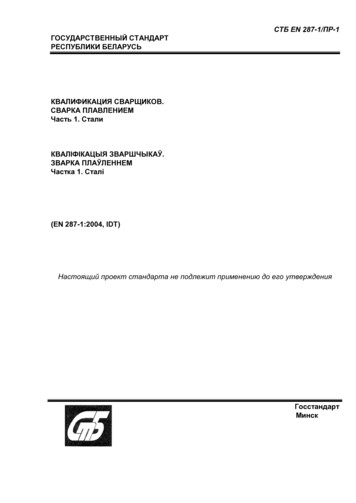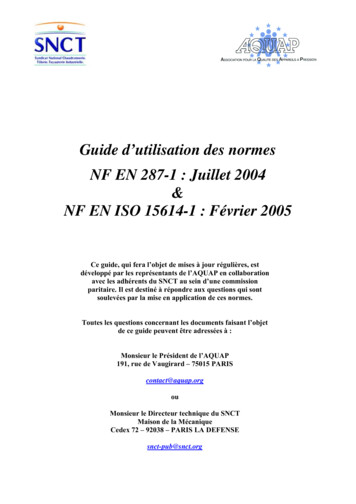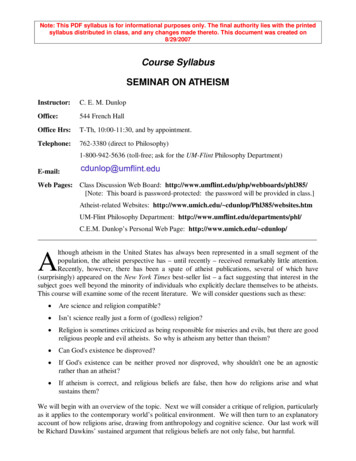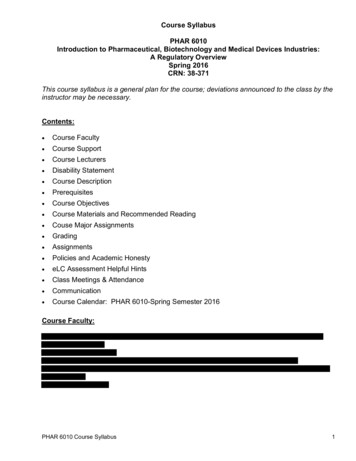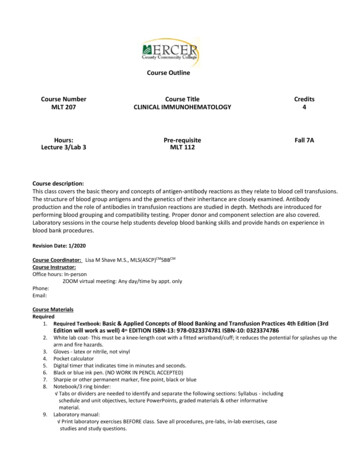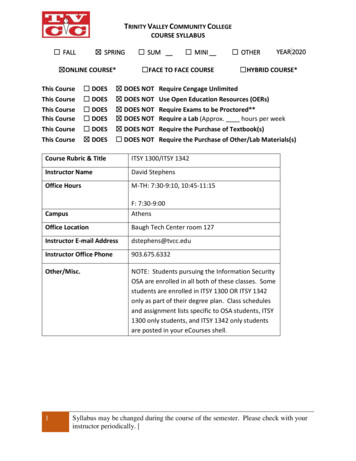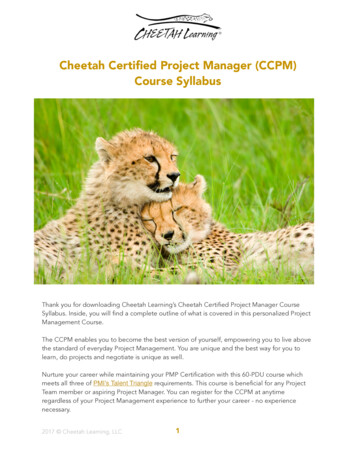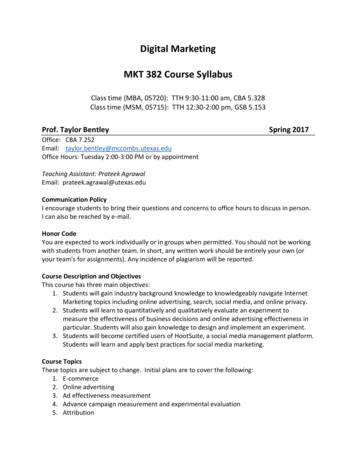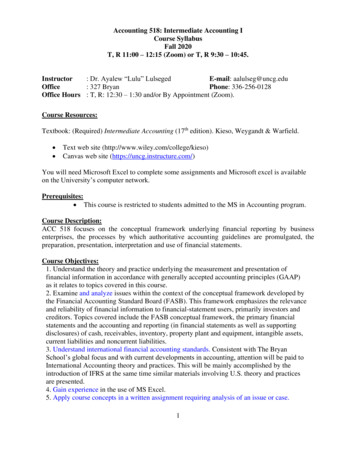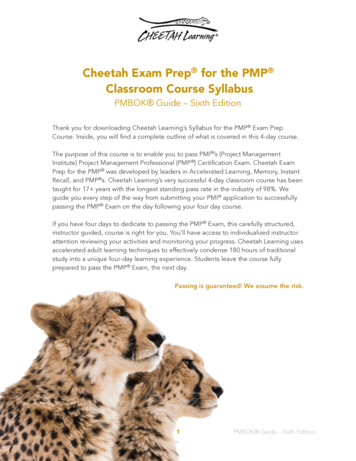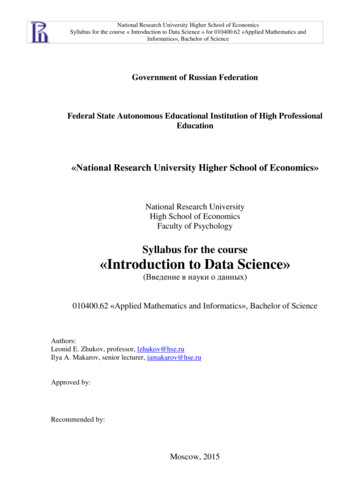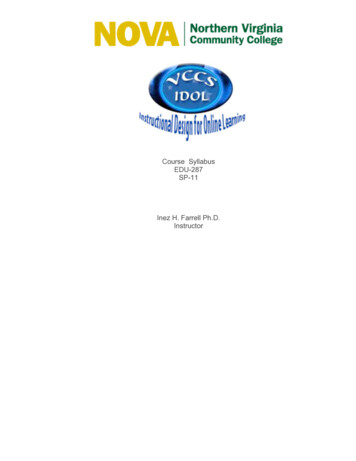
Transcription
Course SyllabusEDU-287SP-11Inez H. Farrell Ph.D.Instructor
ELI Distance Learning Orientation1. MEET THE PROFESSORName:Inez H Farrell, Ph.D.Office Location:Virtual- https://vccsedu.webex.com/vccseduOffice Hours OnlineMeetingnumber:643 936 112Typically, I am in the virtual office MondayTuesday 7-9 PM-Saturday 9AM-10AM. I will beavailable at other hours upon request.MeetingIDOLpassword:Office Phone:703.764.5036Office Email:ifarrell@nvcc.eduWebsite:Contact Policy(email, voice mail):E-mails: Students who email the instructorMonday-Thursday can ordinarily expect aresponse within 48 hours. Students who e-mailFriday-Sunday can ordinarily expect a responseby 5:00 pm on Monday.Phone Messages: The instructor checks phonemessages occasionally during the week andfrequently works from home, so the preferredmethod of communication will always be email.Phone messages will be returned within 2 days.2. PROFESSOR’S INTRODUCTIONWelcome to IDOL! Let me introduce myself. My name is Inez and I have beenfull-time with the Virginia Community College System for ten years, and anadjunct for three years prior. The first five of those full-time years was spent atVirginia Western Community College where I was the Coordinator of InstructionalTechnology and Distance Learning. Then the system office scooped me up to bethe Director of Instructional Technology. I am still actively engaged with some ofthose responsibilities while I await the launch of a next exciting career move. Iwill be directing the new statewide distance learning initiative for NOVA’s ELI thatwill enable students across the state to benefit from the rich assortment ofcourses and expert instructors Virginia’s Community Colleges has to offer.I have two adult children and two step children who sometimes share with me myeight beautiful grandchildren. I am fortunate to live on 8.5 acres of woods inSalem, VA with my Tibetan Terrier Bodhi, and two Siamese rescue kittens Kusaand Sufi. I love to read, paint, play the piano, and watch HGTV.
I am excited you have accepted the challenge of this course that will focus on thebest instructional design practices for online learning. I will be your facilitator(instructor). I am looking forward to working with you over the next ten weeks.As I type this, my kitten Sufi is climbing across the keys and I am not sure whatlanguage she knows brrrrrrrreep. Should you find a stray character here andthere that has escaped my editing-I blame her.As we begin this journey together, should you have additional questions orconcerns, and I can be of assistance do contact me. Office ph: 703.764.5036Email: ifarrell@nvcc.edu3. COURSE PRE-REQUISITESParticipants must have a working knowledge of using the VCCS Blackboard (Bb)course management system for instruction and student assessment.4. ENTRY LEVEL SKILLS/KNOWLEDGEParticipants need to be aware of the technology expectations in a distancecourse.4.1 Prerequisite Skills:Participants in online classes must be proficient users of the World Wide Weband are responsible for adhering to all the following criteria. If you are unable tofulfill these requirements, another class delivery method is more appropriate foryou.You must be able to check the class Web site and your e-mail daily or everyother day for most online classes.You must have sufficient Internet access to do all the class activities, and you areresponsible for finding alternative resources when necessary.You must use an approved version of a Browser to perform all class Webactivities.You must have strong Internet research skills.You must be able to perform the following Web browser functions: Locate and follow hyperlinks and navigate "back" and "forward"Add and access favorites/bookmarks so you can revisit important websitesEdit your Web browser preferencesAdjust font size for reading web pagesAdjust color preferences for reading and printing web pagesConfigure mail settings in browser to activate "mailto" hyperlinks (optional)Save files to disk as Plain Text and as HTMLUse the "Go" or “History” function to access recently visited pagesReload (refresh) the screenPrint Web pages--adjust page setup and print options so that the URL(web address) and access date are printed on the page (it is a good ideato print all important pages or at least the top levels of important sites toprovide a record of your access)Use your browser Help files for additional assistance.
4.2 Research Skills:Participants should possess computer skills to do online research using a varietyof search engines; be familiar with your college’s library website and availablemethods of obtaining articles and documents via the NVCC library resource site.4.3 Writing and Communication Skills:Participants should possess a firm command of written communication skills,including the mechanics of writing and grammar, the ability to organize thoughts,and the ability to demonstrate those skills in all written work.Spelling and grammar are very important in an online course. What you put intoan online course reflects on your level of professionalism.Observation of "Netiquette":All of your online communications need to be composed with fairness, honestyand tact. You should possess a solid understanding of the well- ‐accepted rules ofNetiquette as you will be expected to adhere to these rules when communicatingelectronically with the instructor and your fellow students while participating inthis course.4.4 Computer Literacy:Participants in online classes must be proficient with the basic functions of aword processor as listed below. If you are unable to fulfill these requirements,another class delivery method is more appropriate for you.For word processing, the following software and skills are essential:Approved Word processing software (note that Microsoft Works is not compatiblewith MS Word) or the ability to turn in assignments with a file extension of .doc,docx, .rtf, or .pdfEdit: copy, cut, paste, find, replaceManage files using the directory system of the operating system (thisencompasses creating new files and folders, as well as being able to navigatethrough your operating system and word processor to perform open, close, save,and save as functions)4.4.1 Software:OperatingSystem (OS)BrowserSee table belowSupported Plugins and ction?pageId 38830689Browser Settings:Download signed ActiveX controls - “enabled”Download unsigned Active X controls - “disabled”Run ActiveX controls and plug-ins - “enabled”Allow Cookies - “enabled”
Audio/VisualMediaPlayersInstructionalSoftwareAllow per-session Cookies - “enabled”Active scripting - “enabled”JavaScript & Cookies must be enabledScripting of Java applets - “enabled”Disable pop-up blockers (or add http://learn.vccs.edu to trustedsites)Windows Media Player 9 or higherFlash 9 or higherLatest version of JavaThe following downloads are recommended for Blackboard use:Adobe Acrobat Reader - http://get.adobe.com/reader/Microsoft Word Viewer (needed only if you do not own MSWord or compatible word Processing 44981.aspxMicrosoft PowerPoint Viewer (needed only if you do not ownMS-PowerPoint)- 9811033.aspXJava Virtual Machine (only needed to use the Virtual ClassroomFeature) - http://www.java.com/en/download/manual.jspMozilla Firefox (recommended browser) tCheck to see if your computer has the required plug ins:http://tncc.edu/browsertest4.4.2 Hardware:*You will also need an audio headset with microphone for this course.5. COURSE DESCRIPTIONIDOL is a ten- ‐week online course that covers content development and coursestructuring for online and hybrid teaching and learning. Participants will learn touse the Quality MattersTM rubric (http://www.qualitymatters.org) to design/reviewtheir course structuring and will learn to use the ASSURE instructional designmodel as a means of selecting, designing, and/or developing course content.IDOL is comprised of the following eight learning units:1. Analyze Learners / Course Overview and Introduction2. State Objectives / Learning Objectives3. ADA Compliance4. Select Methods, Media and Materials / Resources and Materials5. Utilize Media and Materials / Multimedia Technology6. Require Learner Participation / Learner Interaction
7. Evaluate and Revise / Assessment and Measurement8. Follow- ‐up and Self ReflectionThroughout the ten- ‐week course learners will complete a course design project(CDP) that includes a minimum of three learning deliverables within an onlinecourse site (Start Here, syllabus, and one complete learning unit). Uponsuccessful completion of the course the learner will receive a certificate statingthey are certified to design online courses for the VCCS.6. COURSE GOALS AND OBJECTIVES:After completing this course, the student will be able to: Identify the six steps of the ASSURE model and explain how each step isused in designing lesson plans for a course Summarize the eight (8) General Review Standards of the Quality Matters(QM) rubric, and design learning modules for an online course to meet the17 essential 3-point review standards of the rubric Complete a course design project that includes three separatedeliverables in the form of a "Start Here" content area, a course syllabus,and at least one learning module that follows the guidelines of theASSURE model and the Quality Matters(QM)rubric Write course-level and module-level learning objectives that areobservable and measurable Apply the concept of alignment to ensure that assessment andmeasurement, resources and materials, learner interaction, andmultimedia technology are all directly tied to the learning objectives of thecourse and learning modules Identify basic principles and core concepts of the Americans withDisabilities Act (ADA) and design a statement that directs students to ADApolicies and/or guidelines for the institution. Identify the three forms of learner interaction within an online course anddesign activities that foster learner interaction Select and create three multimedia elements and /or materials thatsupport the learner's course outcomes as stated in their course designproject Design and develop assessment strategies that measure effectivelearning and assess student progress Identify the key components, which you have learned throughout thiscourse, and describe how you will utilize them within your own onlinelearning environment6.1 Textbook:The following textbooks will be required for this course. If you do not have acopy of the text please contact your instructor immediately.
TextbookTitleAuthorISBNBuilding Online Learning Communities: Effective Strategies forthe Virtual ClassroomRena M. Palloff and Keith Pratt (2007)978-0-7879-8825-8TextbookTitlePreparing Instructional ObjectivesAuthorISBNBrochureTitleMager, R.F. (1997)1- lsQuality MattersTM Rubric for Online and Hybrid Courses2008-2010 edition brochure7. COURSE APPROACH7.1 Instructional Approach:Communication, student-to-student and student-to-instructor, is critical in anonline course. Since we cannot have “class discussions” in the traditional sense,we will use various features built into Blackboard’s Communication system in lieuof face-to-face interaction.7.1.1 E-mail:Each student MUST have an active VCCS G-mail account. Your VCCS G-mailaccount is the official e-mail address that is used for any communication betweenyou and your instructor. E-mail may also be sent from student-to-student, orstudent-to-instructor using the e-mail feature in Blackboard’s Communicationarea.7.1.2 Discussion Board (threaded discussion forum):This is also located in Blackboard’s Communication area. Each threadeddiscussion is called a forum. Only the instructor can create forums, but students
may reply to any forum posted. There will also be a “Help” forum for students topost and reply to questions (this keeps our e-mail to a minimum).7.1.3 Chat (real-time collaboration):Collaboration is a synchronous (real-time) tool, located in Blackboard’sCommunication area. We will not use that tool. We will be using NOVA’s WebExconferencing tool for web conferencing. Two chats are planned for the IDOLcourse. Dates and times for the chats will be posted in an announcement by theinstructor. The URL for the WebEx web conferencing room is: NOVAMeet8We may also use Adobe Connect for a guest speaker event. That URL ishttps://live.vccs.edu/ontap/7.2 Student responsibilities:Participants enrolled in this course should continually monitor their learning,evaluating their own efforts, and actively seek help when needed in a timelymanner. To successfully complete the Instructional Design for OnlineLearning course, you will need to assume an active role in the learning process;ask questions, complete assignments, participate in discussion and group chatsessions, and complete all assignments.7.3 Instructor Responsibilities:It is my responsibility to help students grow and learn. This means that I will tryto provide clear instructions for all projects, answer questions about theassignments, identify additional resources as necessary, provide reviewquestions and study guides for assessments, and provide rubrics and othercriteria for evaluation of projects. This is never a “static” course - referencedreadings, software versions and hardware specifications can change quickly. Inthis environment, the instructor is always evaluating, revising and clarifyingquestions and problems.7.4 Course Feedback:Participants who e-mail me Monday – Thursday will ordinarily receive a responsewithin 48 hours. Students who e-mail me Friday – Sunday may expect aresponse by 5 pm on Monday. All projects that are completed and received bythe due date will be graded and returned to the student in 7 to 10 days.Participants are expected to retain an electronic copy of all work submitted. Iftransmission of the work fails, participants are expected to “resend” thedocument under directions of the instructor. Projects will be submitted inBlackboard either through a discussion thread or via the assignment features.Participants are expected to verify their own Blackboard responses by returningto the appropriate place in Blackboard after the work has been posted.8. Grading CriteriaYou must complete ALL assignments and achieve a minimum of 800 points(80%). Simply receiving 800 points will not allow you to become certified. Youmust complete all assignments and discussions, in order to successfully passthis course and receive your certificate. Also, please note that course feedback isof utmost importance - you will not receive your certification unless you completethe evaluation at the end of the course.
GRADINGSCALELETTERA 90100%B 8089%C 7079%D 6069%POINTS90O1000F 0-59%0-599800-899700-799600-6999. COURSE POLICIES9.1 Students with Special NeedsStudents who need disability-related classroom accommodations areencouraged to register for support services with the Office of Services forStudents with Disabilities. vices/index.htmlParticipants who need disability-related classroom accommodations areencouraged to contact the instructor prior to the second week of the course.9.2 Academic HonestyIt is the philosophy of the Extended Learning Institute that all participants shouldadhere to the student code of conduct found in the Student Handbook and underELI Policies and c Dishonesty:Officials of Northern Virginia Community College certify successful completion ofwork for degrees, diplomas, and certificates when satisfied that the absoluteintegrity of the student has been maintained in the completion of such work. It isimperative that students maintain a high degree of individual honor in theirscholastic endeavors.Scholastic dishonesty will not be condoned under any circumstances. In theevent that a student is suspected of violating the College’s policy on scholasticdishonesty, the faculty member directly involved will investigate the matter. If thefaculty member believes the student has violated the policy, the faculty memberwill inform in writing his or her Academic Dean and the student of the evidenceand the intended question, the assignment of a failing grade for the course, and/or a recommendation for possible dismissal from the College. If the facultymember recommends that the student should be dismissed from the College,then the Academic Dean must contact the Vice President for Academic Affairsand the Vice President for Student Affairs.The Dean will immediately forward all written records to the Vice President forStudent Affairs or designee. When the Vice President for Student Affairs ordesignee receives information that a student has allegedly violated a rule,
regulation, policy, or procedure, then the administrator will initiate the VicePresident for Student AffairsDisciplinary Proceeding Procedure. The Vice President for Student Affairs willcontact the Vice President for Workforce Development in the case of WorkforceDevelopment courses.If a student disputes the final course grade, then the student may follow the FinalGrade Appeal Process.9.3 Late Work PolicyProjects and discussions are due on specific dates (this is NOT acorrespondence course to be completed when convenient). Late work will NOTbe accepted unless there are extenuating circumstances and it will be up to theinstructor to determine whether or not to accept the assignment.NOTE: Should you run into an instance where your work will be late you mustcommunicate with the instructor prior to the due date for that assignment. If youfail to contact the instructor prior to the due date for the assignment, your gradefor that assignment will be penalized.9.4 Course WithdrawalYou may withdraw from a distance learning course without grade penalty by theLast Withdrawal Date without F . For your specific course dates, refer to theQuick Start Syllabus mailed to you by ELI. For additional information, seeEnrollment Dates and Withdrawal Policy. Use NovaConnect (preferred method)or Telephone NovaConnect (also see How to Drop With Refund) to withdrawbefore the Last Withdrawal Date. If you withdraw from a course after your LastWithdrawal Date, you will receive an "F" for a grade.Important Notes:Students who do not start their distance course within the first two weeks will bedropped with no refund.Students who do not send in their minimum required assignments as specified bythe instructor by the Inactive Student Withdrawal date will be administrativelywithdrawn from the course with no refund. Consult the course syllabus for thisinformation.Instructors also have the option of withdrawing (without refund) students who arenot meeting course progress requirements by the Last Withdrawal Date without F. However, students who expect a W are responsible for withdrawing themselvesin NovaConnect before the last withdrawal date.If you are past your Last Withdrawal date without F but have mitigatingcircumstances that prevent you from finishing the course, your instructor mayagree to assign a W grade. To request a W, complete a Withdrawal Initiated byStudent form and submit it to your instructor with supporting documentation thatjustifies your request9.5 Course DisclaimerEvery attempt is made to provide a syllabus that is complete and that provides anaccurate overview of the course. However, circumstances and events may makeit necessary for the instructor to modify the syllabus during the course. This maydepend, in part, on the progress, needs, and experiences of the participants.
Email: ifarrell@nvcc.edu 3. COURSE PRE-REQUISITES Participants must have a working knowledge of using the VCCS Blackboard (Bb) course management system for instruction and student assessment. 4. ENTRY LEVEL SKILLS/KNOWLEDGE Participants need to be aware of the technology ex
